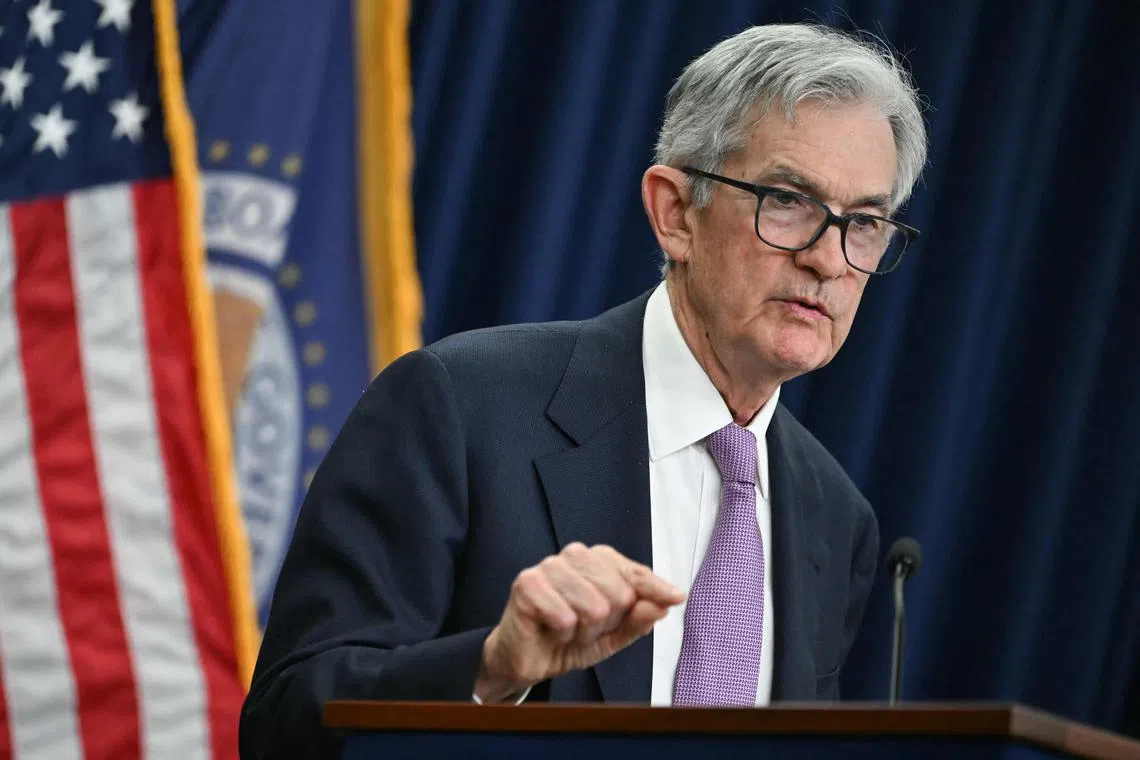US Fed cuts interest rates a quarter point after Trump victory
Sign up now: Get ST's newsletters delivered to your inbox

Federal Reserve chairman Jerome Powell speaking during a news conference following the November Federal Open Market Committee meeting in Washington on Nov 7.
PHOTO: AFP
WASHINGTON – The US Federal Reserve shrugged off concerns about the impact of Donald Trump’s election victory on interest rates and moved ahead with a quarter-point cut on Nov 7, looking to continue easing borrowing costs on the back of cooling inflation.
The Fed sits just a short walk from the White House, where Democratic President Joe Biden will in January hand back the keys to Donald Trump following the Republican’s election win.
But as expected, policymakers ignored the political drama playing out up the road, voting unanimously to reduce interest rates by 25 basis points to between 4.5 per cent and 4.75 per cent, the Fed said in a statement.
“In the near term, the election will have no effects on our policy decisions,” Fed chairman Jerome Powell told reporters, noting there was still uncertainty about what President-elect Trump’s actual economic agenda would be.
“We don’t guess, we don’t speculate, and we don’t assume,” he said.
Mr Powell also said he would not resign
His comments underscore the delicate balancing act policymakers may have to play in the next Trump administration, given the US President-elect’s recent criticism of the Fed.
On the campaign trail, Trump repeatedly accused Mr Powell – whom he first appointed to run the US central bank – of working to favour the Democrats, and has suggested he would look to replace him once his term as Fed chairman ends.
The President-elect has also said he would like “at least” a say over setting Fed interest rates, something not currently allowed under the bank’s dual mandate from Congress to act independently to tackle both inflation and unemployment.
The US central bank’s rate decision should help ease the costs of mortgages and other loans – welcome news for consumers, who had widely cited the cost of living as a top concern ahead of the Nov 5 vote.
But the cost of borrowing will also depend on what the financial markets think a Trump victory means for the economy over the longer term, and where the Fed’s interest rates will need to settle to ensure inflation remains now.
Experts have pointed to the post-pandemic surge in US inflation – which saw consumer prices rise more than 20 per cent – as playing a major factor in Trump’s victory.
The Nov 7 decision adds to a previous rate cut in September, when the Fed kicked off its easing cycle with a larger half-point decrease, and pencilled in additional rate reductions in 2024.
The Fed’s favoured inflation gauge has since eased to 2.1 per cent in September, while economic growth has remained robust.
The labour market has also stayed strong overall, despite a sharp hiring slowdown in October attributed in large part to adverse weather conditions and a labour strike.
‘Economy looks quite resilient’
“Generally speaking, the US economy looks quite resilient, and the labour market still looks very good,” Mr Jim Bullard, the long-serving former St Louis Fed president, told AFP ahead of election day.
Mr Bullard, now dean of the Daniels School of Business at Purdue University, predicted a 25-basis-point cut this week, and another cut of a similar size in December.
Futures traders place a probability of just over 65 per cent that the Fed will cut rates by a quarter of a percentage point in December, according to data from CME Group.
But analysts remain split over what the Fed will do in December.
Fiscal discipline ‘broken down’
With a Trump victory assured, a lot still depends on whether Republicans can win the House of Representatives, as they appear on track to do – giving them a “Red Sweep” of both Houses of Congress along with the White House.
“Markets tend to like divided government as a way to control spending and keep deficits down,” said Mr Bullard.
“What’s distressing to an economist like me is that, really, fiscal discipline has broken down for both political parties,” he added.
The bond markets reacted sharply to Trump’s victory, with the yield on the widely traded 10-year US Treasury note jumping as traders predicted the Fed might need to keep rates higher for longer to accommodate some of the former president’s policy proposals. AFP


